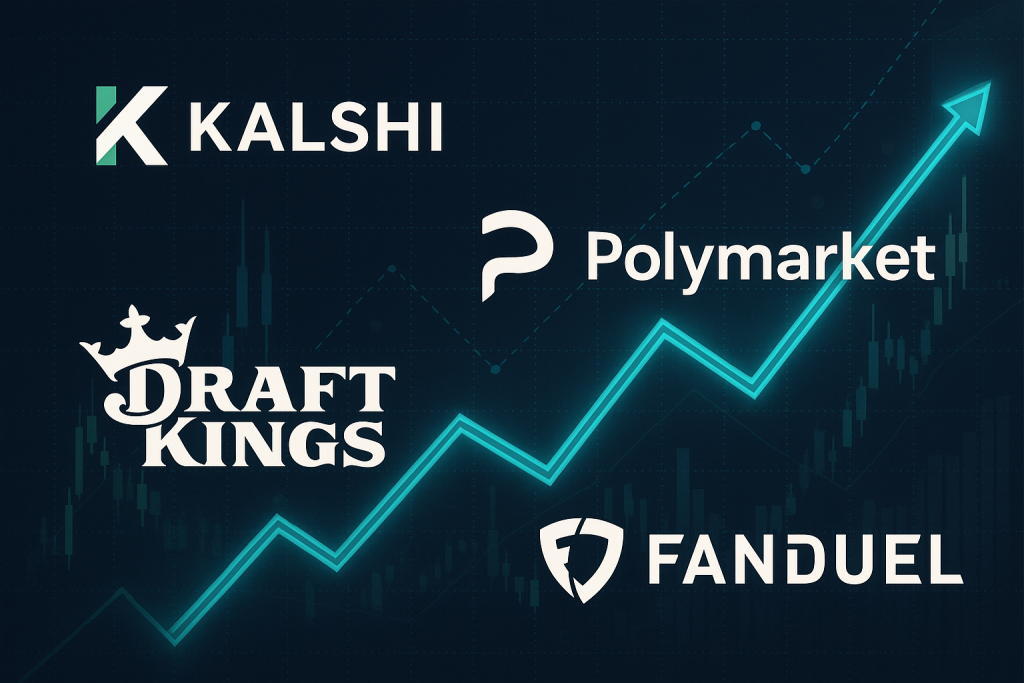October 2025 — The rapid rise of blockchain-based prediction markets is reshaping the U.S. online betting industry. Platforms like Kalshi and Polymarket have begun to challenge traditional betting giants such as FanDuel and DraftKings, fueled by record-breaking trading volumes and investor interest.
Prediction Markets Gain Momentum
According to Bloomberg, the volume of prediction contracts traded on Kalshi exceeded 2.5 billion, signaling a massive influx of users and liquidity. Following reports of rising transaction activity on Robinhood Markets and Kalshi, shares of major bookmakers plunged — with DraftKings dropping over 16% and Flutter Entertainment, the parent company of FanDuel, losing around 8% in just one week.
Wall Street analysts responded swiftly, cutting target prices and even downgrading DraftKings to a “sell” rating for the first time since 2022.
“These companies must present a clear strategy to investors — either by launching their own prediction markets or ramping up marketing efforts,” said Jordan Bender, an analyst at Citizens. “Until then, decentralized prediction platforms will keep eating their market share.”
From Political Bets to Sports Forecasts
Originally popular for political event predictions, Kalshi and Polymarket are now aggressively expanding into sports-based contracts. According to Dune Analytics, weekly prediction activity on Kalshi surpassed 2.5 billion contracts by the end of September, while its collaboration with Robinhood now allows users to wager on everything from NFL games to election outcomes.
Robinhood CEO Vlad Tenev revealed that the company’s prediction markets have reached over 4 billion total event contracts, with half of that volume generated in Q3 2025 alone.
“Prediction markets are often dismissed as gambling — much like cars were once called ‘horseless carriages’,” Tenev noted. “But they’re fundamentally transforming how people trade, bet, and anticipate real-world events.”
New Tools and Tax Advantages
Kalshi has also launched support for custom parlay contracts, allowing users to combine multiple predictions — a model similar to parlay bets, which have been key profit drivers for traditional sportsbooks.
Moreover, analysts pointed out that prediction traders enjoy significant tax advantages, as their positions are often treated as financial contracts rather than gambling activities under U.S. tax law — a legacy of Trump-era regulatory changes.
Adding to the intrigue, Donald Trump Jr. has joined Polymarket as an advisor following an investment from his venture capital firm, further blurring the line between politics, fintech, and entertainment.
Regulatory Challenges and Market Shifts
Despite their growth, some U.S. states have accused Kalshi of violating gambling laws. In response, FanDuel partnered with CME Group to develop its own prediction-based derivatives products — an effort to stay competitive as this new market segment accelerates.
Still, traditional operators maintain strong investor backing. Over 80% of Wall Street analysts continue to rate DraftKings and Flutter Entertainment as “buy,” even amid mounting pressure from decentralized competitors.
However, the speed of user adoption within prediction markets has sparked concern in the industry.
“Prediction markets are gaining momentum during the critical NFL season, while DraftKings’ growth appears to be slowing. They’re becoming a legitimate alternative,” said Ben Axler, founder of a New York–based investment fund.
The Future of Betting is On-Chain
With prediction platforms integrating blockchain, offering tokenized outcomes and on-chain resolution, they’re redefining the intersection of finance, gaming, and speculation.
If this trend continues, 2026 could mark the year decentralized prediction markets surpass traditional sportsbooks in transaction volume — signaling a structural shift in the $11 billion global betting industry.


